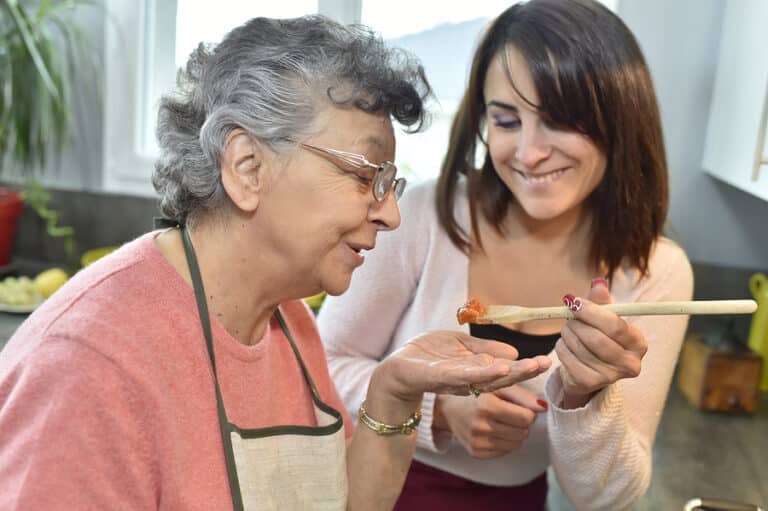Late-stage Alzheimer’s disease comes with many challenges. At its most severe, Alzheimer’s may cause your mother or father to have difficulty swallowing. This happens concurrently with a loss of interest in food.
Don’t panic. There are many ways to mitigate this issue. Try some of the following:
Introduce Soft Foods
Home Health Care in Almena MIThere are many foods that require little to no effort to swallow that also provide good nutrition. Several dairy products provide easily consumed whole protein, including:
- Whole milk. Whole milk doesn’t have to be chewed and goes down easily. Most late-stage Alzheimer’s patients need whole, rather than reduced fat, milk because they are experiencing weight loss.
- Ice cream. Especially if your parent has a sweet tooth, this is a tempting treat.
- Flavored yogurt. Plain yogurt may taste too sour for a late-stage Alzheimer’s patient, but yogurt that is sweetened with fruit and sugar is extremely palatable, and it’s loaded with protein. Some yogurts pack a quarter of the day’s protein requirement in one cup or less.
- Applesauce. Applesauce has good fiber and nutrients while being very easy to swallow and digest.
Grinding and liquidizing foods
Most foods, and certainly all fruits and vegetables, can be reduced to a sauce or liquid form, either in a blender or food processor. You don’t need any equipment more specialized than an ordinary blender to do this.
Fruits and vegetables like cucumbers, tomatoes, zucchini, apples, bananas, berries, and boiled potatoes have enough moisture in them to be easily blended without adding fluid. When blending nuts, meat, or harder vegetables, like garbanzos, cabbage, and raw bell peppers, you will need to add some oil, some soup broth, or some salad dressing to get the product down to a liquid.
Eliminate choking hazards
Encourage your senior to take her time chewing and eating. You can model slow, careful eating by doing it yourself. If your senior tends to drink or eat too quickly, keep portions small. You can serve seconds if need be.
Make sure that your parent only eats when sitting upright in a chair. Alzheimer’s patients should not eat lying in bed or when in a reclined position, because that could lead to choking. Late-stage Alzheimer’s patients may need a chair with tall sides, ending in arm rests, and an installed tray to prevent the patient from falling while eating.
How Home Health Care Can Help
While hired home health care isn’t required for patients with late-stage Alzheimer’s, be aware that it can be very difficult to care non-stop for someone who needs this level of monitoring.
Home health care aides are trained specifically to understand and meet the challenges of caring for patients with severe cognitive deficits. They can undertake the difficult work of managing medications, preparing safe, nutritious meals, and other tasks that may be physically or emotionally too demanding for family members.
In conclusion, late-stage Alzheimer’s patients need an unusual level of competent care. Even the most dedicated caregivers will need to take a break now and then. It is wise to make a list of things you can manage and things you cannot manage. Then find help with the list of things that are too much.
Sources
https://www.nia.nih.gov/health/coping-late-stage-alzheimers-disease
https://www.seatingmatters.com/chairs-for-dementia-patients
https://www.businessinsider.com/yogurts-with-the-most-protein-2016-4
If you are considering home health care in Almena, MI, for an aging loved one, please call the caring staff at Fresh Perspective Home Care at (269) 329-4717. We are here to help!
- How To Help Your Senior Parent Reduce Stress - March 26, 2025
- Celebrating March Birthdays, Anniversaries and New Team Members! - March 11, 2025
- MARCH HIGH FIVE! - March 11, 2025



